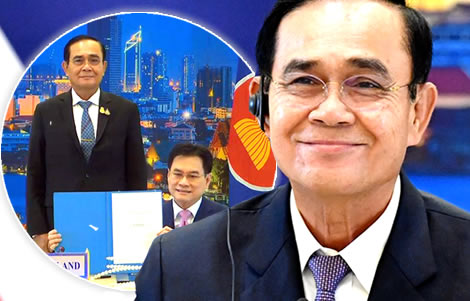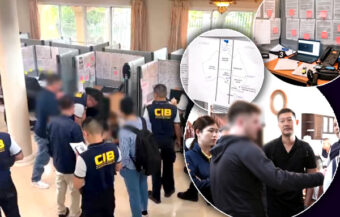The trade deal is a definite blow to US interests in the Asia Pacific while key economists see it leading to enhanced prosperity and integration within the ASEAN bloc and wider region. A major feature of the pact is that it focuses on trade and the practicalities of commerce while ignoring labour and environmental issues which is the hallmark of Chinese diplomacy and something welcomed quietly by many business leaders within the 15 member bloc including those in Australia and New Zealand who are hailing it as a unique commercial opportunity.
From Hanoi, today and online, the world’s biggest trade pact has been signed in what is a boost for the Thai economy giving Thai exporters the promise of greater and unhindered access to what will be one of the biggest markets in the world with the near elimination of all tariffs and harmonisation of trade to be implemented over the next twenty years. The Regional Comprehensive Economic Partnership or RCEP is ideally suited to Thailand’s export industry as it focuses solely on trade, has the 10 nation ASEAN bloc at its centre and cements the kingdom’s burgeoning relationship with China.

Thailand, along with 14 other nations, has signed the Regional Comprehensive Economic Partnership (RCEP), the largest free trade deal the world has ever seen, on Sunday.
The signing took place during an online ceremony hosted by this year’s ASEAN’s leadership in Hanoi, Vietnam. It brings to an end nine years of negotiations and wrangling since the pact was conceived in 2011 with many of the trade chapters being ironed out before the Bangkok summit in 2019.
Great credit due to Thailand’s Commerce Minister
Great credit for the culmination of the agreement must go to Thailand’s Commerce Minister Jurin Laksanawisit who, this time last year, had pushed hard to have the agreement finalised and signed off in Bangkok only to find his efforts thwarted by growing tensions between China and other countries and the sudden withdrawal of India from the pact after raising last minute qualms.
The agreement, signed today, includes the 10 nation ASEAN bloc, China, South Korea, Japan as well as Australia and New Zealand.
92% of tariffs to be slashed with the harmonisation of trade and transport over the next twenty years
The pact will see 92% of trade traffic, within the 15 nation free trade area, scrapped over the next twenty years. It will also see simplified and more robust customs and transport arrangements between the countries.
The area represents over 30% of the world’s population and a similar share of GDP which was estimated last year at a whopping $26.2 trillion which exceeded that of the European Union which, in 2019, represented 22% of the world economy with a GDP of only $18.29 trillion.
More integrated supply chains across Asia
Just before the historic signing on Sunday, the Vietnamese Prime Minister, Nguyen Xuan Phuc issued a statement: ‘The completion of negotiations is a strong message affirming Asean’s role in supporting the multilateral trade system.’
He said that the agreement would help boost economic recovery from the Covid-19 pandemic and in particular, lead to more developed supply chains in the Asia Pacific region.
Word of caution – the agreement is signed but must be triggered by key ratification conditions
However, a word of caution. The signing of the agreement on Sunday does not mean that the agreement comes into force yet. This can only be triggered when six ASEAN countries ratify the accord in addition to three of the other five countries outside the Southeast Asian bloc.
The Minister of Trade and Industry for Singapore drew attention to this in his remarks. Chan Chun Sing, however, reaffirmed the city state’s commitment to the pact and said Singapore would ratify it within months.
He looked forward to greater protection of online consumers as well as advances in technological co-operation between the countries.
Deal leaves the door open for India
The deal, signed on Sunday, leaves room for India to retake its position as a party to the pact if it decides to pursue it. Analysts see this as a good faith signal from Asia’s emerging superpower while the agreement is seen as a victory for Chinese diplomacy in the Asia Pacific.
‘The clause allowing India to join at a later date is symbolic and shows China’s desire to build economic bridges with the region’s third-largest economy,’ Chief Economist for the Asia Pacific at S&P Global Ratings, Shaun Roache, said in a statement to the media.
Plans to work with the Indian technology sector but Indian PM pulled out to protect the vulnerable
The loss of India in 2019 was a particular blow to Thailand which had been looking forward to a closer relationship with its dynamic and advanced IT sector with close links to Silicon Valley.
India’s Prime Minister, Narendra Modi, pulled out this time last year after a prolonged struggle with his conscience as he weighed up the export potential for the world’s third-largest economy with the devastation that small firms and farming families may have faced in a more unprotected trade environment.
The Indian PM acted to safeguard the most vulnerable in Indian society as the country’s economy is not developed sufficiently to compete with more efficient and scaled competition from other Asian countries particularly China.
His decision has since been widely endorsed at home in India and understood even by the subcontinent’s most progressive figures while a small minority of others have described it as a mistake and lost opportunity.
Many leaders on Sunday expressed a hope that, at some point, India would be free to rejoin the pact.
Japan sounded a confident note on Sunday
On Sunday, the Japanese trade minister was quite bullish even though his country had been rumoured, earlier on this year, as having gotten cold feet about the deal.
‘Through the tariff removals, I believe there’ll be a major impact on improving Japan’s exports and making the region’s supply chains more efficient,’ said Hiroshi Kajiyama. ‘I strongly believe we are building free and fair economic rules through introducing new rules on data free flows and the banning of demands for technology transfers, as well as the protection of intellectual property.’
Blow to US interests in the Asia Pacific region
The signing of the pact, coming just over a week after what appears to be the loss of the US presidency by President Trump, is a blow to America’s leadership role in the region.
One of the first acts of President Trump, when he assumed office in 2017, was to pull the US out of the Trans-Pacific Partnership, a wider Asia Pacific trade bloc including Mexico, Peru and Canada that excluded China and which had been seen as a balancing and counter move to Chinese hegemony in the region.
That agreement has since been pushed forward as the watered-down Comprehensive and Progressive Agreement for Trans-Pacific Partnership (CPTPP). The two competing agreements are different in that the Chinese backed RCEP does not have ancillary requirements or objectives outside the scope of boosting and harmonising trade such as labour and environmental standards.
Australia pressed ahead with the deal despite smouldering tension between the country and China
The other significant aspect of Sunday’s breakthrough signing is how it will impact the smouldering tensions between Australia and China in recent months that had even led to speculation in Canberra that the country must be prepared for the prospect of military conflict with Beijing due to its expansionism.
Some weeks ago, Australian officials indicated that they saw the pact as a way of helping to iron out the tension between the two countries by focusing on trade while the commonwealth country continues to be strong in its forthright criticism of China’s actions on human rights, spying and its provocative activities in the South China Sea.
An exclusively commercial free trade agreement which is being welcomed by business leaders
Many business leaders across the region are quietly satisfied by the purely commercial approach taken by the pact’s creators in focusing on trade and commerce to the exclusion of social and environmental concerns such as are now a key component of European Union trade deals with Asian countries.
In 2019, Andrew Willocks of the Australian Chamber of Commerce hailed the free trade pact, at that point, finalised in Bangkok and creating a market of 15 countries and 2.1 billion people: ‘This agreement will create huge market access for Australian exporters by further dropping tariff barriers in foreign markets for a wide range of Australian goods.’
On Sunday, a Singapore academic, Pan Zhengqi of the Singapore University of Social Sciences, expressed a hope that the trade deal would help bring China into line, at least, in its trade activities. ‘As such, participating countries – even major powers such as China – might not readily use trade as a strategic leverage,’ he said.
Join the Thai News forum, follow Thai Examiner on Facebook here
Receive all our stories as they come out on Telegram here
Follow Thai Examiner here
Further reading:
RCEP deal agreed as India opts out – busy Bangkok ASEAN summit concludes on a low key
Chinese FM to visit Thailand in a Covid battered world of raised tensions and potential conflict
Prime Minister indicates that the cabinet reshuffle will be complete very shortly with no problem
Thailand’s economy has become dependent on government expenditure to stay above water
Thailand and US aim for a new more ‘proactive’ trading relationship as ambassador meets Prayuth
Rice price spike but drought conditions to recede – security concern for the Mekong river
US suspension of Thai preferential trade partner status part of Trump’s ongoing trade war


















